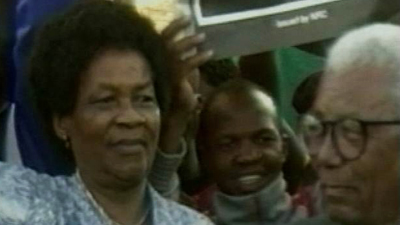Albertina Sisulu was born on 21 October 1918 in the district of Tsomo in the Transkei, the second of five children. Her father, Bonilizwe Thethiwe passed away in 1929 when Albertina was 11 years old. Her mother, Monica, died shortly afterward. Albertina attended the Maria Zell college, a Roman Catholic school in Tsomo. She left school in 1939 after receiving her Junior certificate. She turned her back on her ambition to be a nun and also considered teaching, but did not have the resources. She trained as a nurse, a profession that allowed her to take care of her siblings and later on be the sole breadwinner for her own children. Albertina went to Johannesburg in I941 to the Non-European General Hospital. She qualified as a state-registered General Nurse in April 1944 and as a Midwife in 1954. Albertina was not actively involved in politics until she met Walter Sisulu in 1941. She married him in 1944, and has been quoted as saying she was the only female present at the first meeting of the Youth League. Despite long periods of separation (he spent 26 years in prison), their marriage lasted until his death in May 2003. Her political activity began in 1949 when she joined the ANC’s Women’s league. When Walter was elected as the first full time Secretary-General of the ANC, she accepted responsibility as the sole supporter of the family. Albertina Sisulu was one of the women who led the national demonstrations of no fewer than 20 000 women to the Union Buildings in Pretoria during the famous Women’s March on 9 August 1956. These protests continued afterward as women demonstrated their outrage at the pass laws and the ongoing forced removals. In 1958, Albertina took part in a demonstration organized by the ANC Women’s League in Orlando. She was subsequently jailed with 2000 other women, separated from her 12-month-old daughter Nonkululeko. Sisulu returned to prison in 1963. She was detained for 90 days without trial and charged under the notorious General Laws Amendment Act, as security police tried, in vain to trace the whereabouts of Walter, who had gone underground. Several days later, her eldest son, Max (then aged 17), was arrested and detained under the same law at Marshall Square. Harassed by police after his release, Vuyisile Max escaped the country to Russia. In 1964 Walter Sisulu was sentenced to life in prison on charges of treason and Albertina was banned from public gatherings for five years. In the 1960’s Albertina took on the task of reviving the underground machinery of the ANC and was instrumental in assisting people to leave the country into exile. In 1969, she was again served with a five year banning order, this time confining her to her home at nights and on weekends. In 1979, Sisulu received a two-year banning order, without house arrest and with permission to go to church. On 5 August 1983 Sisulu was again arrested, while attending the funeral service of Rose Mbele, a veteran of the ANC Women’s League. She was tried for furthering the aims of the ANC. Many believed that the real reason for her arrest was the apartheid government’s fear of her participation in the United Democratic Front (UDF). She was sentenced to four years’ imprisonment. Although the case was eventually dismissed, Sisulu spent 7 months in solitary confinement in Diepkloof Prison. On 20 August 1983, between 12 and 15 thousand people attended the launch of the UDF in Mitchell’s Plain, Cape Town. Sisulu was elected as one of three co-presidents. The other two were Oscar Mpetha and Archibald Gumede. On 19 February 1985 Albertina, together with other UDF leaders were arrested and charged with treason and terrorism. They were also accused of trying to overthrow the apartheid regime. Held in remand, the trialists’ lawyers battled to arrange bail. Albertina, the only woman in the group, was kept in solitary confinement. In June 1989, amid intense international pressure, the apartheid government issued Albertina with a 31-day passport. Albertina and her UDF colleagues visited four countries: Sweden, France, the United Kingdom and the United States. She was able to accept invitations to meet various high profile leaders, including U.S. President, George Bush senior, British Prime Minister, Margaret Thatcher and French first lady, Danielle Mitterrand. The main objectives for the trip were to call for sanctions against the apartheid government; to draw global attention to human rights abuses, in particular, persecution of anti-apartheid activists; to fight for the legal right for democratic and peaceful organisations to operate; and to inform the West about the state of affairs in apartheid South Africa. Sisulu’s meeting with Bush was a milestone in that it was the first time an internal anti-apartheid organisation had been invited to the White House. After their meeting, Bush was quoted as saying, “apartheid is wrong and must end”
– By


